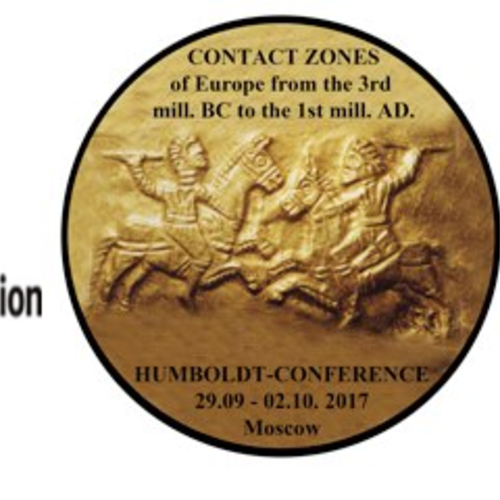Contact zones of Europe from the 3rd mill. BC to the 1st mill. AD”
Conferences

CONTACT ZONES OF EUROPE
from the 3rd mill. BC to the 1st mill. AD.
International Scientific Conference
Humboldt Colleague
Moscow, 29 September – 2 October, 2017
The Institute of World History of the Russian Academy of Sciences and the Alexander von Humboldt Foundation (Germany) with the financial support of the Russian Scientific Foundation (Russia) organize the International Scientific Conference “Contact zones of Europe from the 3rd mill. BC to the 1st mill. AD” in Moscow (Russia) .
Concept of the Conference.
The relationship between cultures belonging to different levels of social complexity is a very relevant topic in the contemporary world where the policy of multiculturalism has recently become an issue of controversial debate.
Europe is not only a geographical, but also a historical, political and socio-cultural concept. The common European identity has been shaped over thousands of years, despite the existence of societies of varying degrees of complexity and of different economic and cultural types. As a result, a powerful center has emerged which has been attractive for the populations of the border areas, causing migration processes of different scales since antiquity.
A contact zone may be defined as a cultural space (not necessarily well localized geographically, it may be mental), historically established as a result of the interaction of various natural and anthropogenic factors.
The existence of specific contact zones in Europe was already known in antiquity, which is reflected in the literary tradition, primarily in geographical and ethnographic works. The vast array of archaeological and anthropological data helps to clarify and verify the data of the Graeco-Roman written tradition. This requires the application of new methods of studying various sources, including the implementation of comprehensive multi-disciplinary research.
Identifying the genesis, ways and conditions of formation and development of different types of contact zones in ancient times may provide a key to understanding contemporary cultural and historical processes.
The lectures and posters will be focused on different forms of cultural contact, methods of their study, and various case studies based on the analysis of sources of different nature, primarily written and archaeological.
Aims of the Conference
- Presentation of the newest results obtained by both Russian and international scholars in their studies of European contact zones in antiquity to the international scientific community.
- Establishment and strengthening of contacts between scientific institutions of the Russian Federation, Germany and other countries.
- Strengthening of international professional networking between alumni of the A. von Humboldt Foundation.
- Rapprochement of scholars from the Russian Federation and abroad. Discussion of themes common to different branches of scholarship – history, archeology, anthropology, linguistics, cultural studies, ethnology.
- Involvement of young scientists of the Russian Federation in the discussion of problems of cross-cultural contacts.
Participation. Participation. The participation for all invited guests, including accommodation and meals during the conference, is free of charge. If it is necessary to help with the travel costs, please contact the Organizing Committee. There are three kinds of participation: 1) a lecturer; 2) a poster-speaker (mainly for young scholars); 3) an attendee (for Humboldt Scholars only). If you would like to present a lecture you are welcome but due to the limited time only a small number of lectures can be accepted, and their papers should be closely linked to the topic of the conference. Working languages of the Conference are English and German.
Pre-Registration dead-line. The 1st of March, 2017 is the dead-line for pre-registration. To pre-register, please fill-in the Questionnaire available on the Site and send it to the Organizing Committee by e-mail (contactzonesofeurope@gmail.com). We expect to get summaries of the presentations before the 1st of June, 2017.
Conference web-site: http://igh.ru/events/mezhdunarodnaya-nauchnaya-konferentsiya-kontaktnye-zony-evropy-v-iii-tys-do-ne-i-tys-ne?locale=en
Questionary List of the Participant
1. Surname / Nachname.
2. Name / Vorname.
3. Acad. Status: 1) Undergraduate 2) Ph.D. Student, 3) Dr. 4) Prof. Dr. none / Akad. Status: 1) Studen 2) Doktorand; 3) Dr 4) Prof. Dr. 5) kein.
4. Research Area / Fachgebiet.
5. Affiliation, Address / Institution, Ort.
6. Country / Land.
7. Participant: 1) Humboldt Scholar 2) Researcher 3 )Young Researcher / Teilnehmer: 1) Humboldt Stipendiat(in) 2) Wissenschaftler; 3) Nachwuchswissenschaftler.
8. Form of Participation: 1) Lecture 2) Poster 3) Visitor / Form der Beteiligung: 1)Vortrag; 2) Poster 3)Besucher
9. Title of the Paper (Poster) / Titel des Vortrages (Posters).
10. Summary of the Lecture (Poster) Ca. 2000 Words / Zusammenfassung des Vortrages (Posters). Ca. 2000 Wörter.
11. E-Mail.
12. Photo / Foto.
We will be happy to see you in Moscow!
Co-chairs of the Organizing Committee
Prof. Askold Ivantchik
ivantchik@u-bordeaux-montaigne.fr
Dr. Valentina Mordvintseva
Secretary of the Organizing Committee
Evgeniia Andreeva
contactzonesofeurope@gmail.com
PRELIMINARY PUBLICATION OF CONFERENCE PROCEEDINGS
04 Nov 2016

| Start: | 10:00, 29.09.2017 |
| End: | 18:00, 02.10.2017 |
| Address: | Москва |
| Program | |
© 2026 Institute of World History, Russian Academy of Sciences
Developed by bitberry.ru